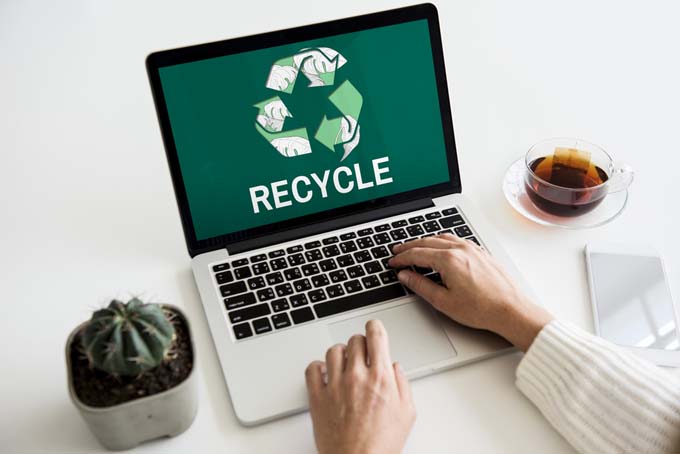"Rethinking Business" at the Forum ö 2022
On October 26, 2022, öbu, the association for sustainable business, hosted its traditional Forum ö. This year's event was themed "Rethinking Business". And indeed, the inputs of the speakers and discussants of the breakout sessions offered much food for thought.

The keynote presentation by Martin Kyburz was an example of what sustainable business looks like. His company manufactures electric vehicles that are used by an increasing number of postal delivery services, including the Swiss Post, among others. While electromobility is currently experiencing a real boom, an associated problem still seems to be unsolved: What happens to the spent batteries and accumulators? There are various recycling approaches, but they generally involve shredding and thermal disposal without material recovery. A process developed jointly with Empa is now being used at Kyburz, with which 90 percent of the materials processed in a rechargeable battery can be recovered. Kyburz has thus been nominated for the Green Business Award. Planted, another nominated company, was also on site and showed concretely what rethinking and transformation in the food sector looks like in practice.
Energy shortage: the solution is "smart energy
The Forum ö 2022 still went with many other topics to the start. One of them was the current energy shortage situation. Three experts from Elektrizitätswerke Zürich ewz explained which scenarios are to be expected. It is not easy at present to make concrete statements about whether there could be a worst case scenario with power cuts. The outlook is too uncertain as to how hard the winter will really be and whether or not the French nuclear power plants, which are so important for Switzerland's electricity needs, will really be able to come back online from January 2023. However, it also became clear in the discussion that the current crisis should be used as an opportunity to curb the consumption of electrical energy and not only to discuss alternative sources of electricity - such as the expansion of solar power plants in mountainous areas, which is now to be waved through by parliament while undermining many ecological principles. In addition, the path must lead to the decentralization of energy systems; "smart energy" is the watchword here.
Rethinking Business in terms of Innovation
Or the topic of innovation through collaboration was also in focus. Postfinance, for example, explained in another breakout session how they approach this topic, especially with regard to the implementation of sustainability goals. Anne-Käthi Leuenberger, Head of Corporate Responsibility, explained that in order to achieve these goals, innovation is essential. As examples, she mentioned the Swiss Climate Challenge, with which Postfinance, in cooperation with Swisscom, wants to make the influence of personal mobility behavior on climate change more transparent via an app. The "reward" is a so-called "Green Coin", a green, digital Swiss franc that can only be used for sustainable products and services. Or another example: with "Velto" a sustainable digital pension solution is launched. Here, too, Globalance is a cooperation partner. Crowda" was also presented in detail, a platform explicitly for SMEs, which can find collaboration partners there for the joint implementation of the UN Sustainable Development Goals. This project is still in its infancy, but could be of particular interest to those companies that are interested in sustainable management but cannot themselves muster the human and knowledge resources required for operationalization.
Of corporate culture and an "earth for all
Further keynotes were given by Nele Kreyssig and Robert Szilinski from esentri AG. They provided an insight into their corporate culture, which consistently places people at the center and relies on self-organization. The fact that this can also lead to rather "special" excesses, for example in the introduction process for a company-owned muesli vending machine, was explained, as were the lessons learned: Ideas are never the bottleneck, it's how to create the space people need for them. "The age of efficiency is over, the age of resilience is now beginning," said Kreyssig and Szilinski.

From the Club of Rome, which first drew attention to the finite nature of resources in 1972, came Till Kellerhoff, who presented the "Earth4All" study in his talk. First, he used statistical data to impressively summarize what would happen if humanity continued in the same style as it has up to now. Insect extinction, the sixth mass extinction in the history of the Earth, is only part of the scenario. Much of the explosive power also lies in the increasing social inequalities and imbalances. The path must therefore take five U-turns:
- New economic structures for low-income countries to fight poverty.
- Eliminate income inequality, for example through higher progressive taxation or greater taxation of wealth.
- Empowering women to bridge the gender power gap.
- Healthy food for all without expanding farmland and combating food waste.
- Transform energy systems to halve greenhouse gas emissions every ten years.
Those present were probably in agreement: These are probably the right goals. The only question is whether there is enough time to achieve them. But it is not too late for "Rethinking Business. It is also to be hoped that the knowledge in companies about the 17 UN Sustainable Development Goals is increasing and is not limited to those circles that attend meetings such as the Forum ö.
More information: www.oebu.ch









